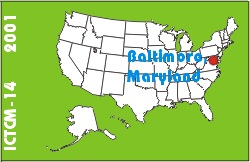
Electronic Proceedings of the Fourteenth Annual International Conference on Technology in Collegiate MathematicsBaltimore, Maryland, November 1-4, 2001Paper C023CBL Activities and Students' Conceptual Knowledge of Functions |
Brenda B. CatesMount Olive College 634 Henderson Street Mount Olive, NC 28365 USA Phone: (919) 658-2502 bcates@moc.edu |
| Click to access this paper: |
ABSTRACT
The purpose of this research project was to investigate the potential benefits of calculator-based laboratory activities on students' understanding of the function concept and graphing in a Standards-based college algebra course. The research questions explored the effects of CBL activities on the ability of college algebra students to: (a) interpret functions in their different representations, (b) translate among the various representations of functions, (c) reify functions, (d) model real world phenomena with functions, and (e) overcome common misconceptions associated with graphing and the function concept.This study utilized a quasi-experimental nonequivalent control group design in which two instructors each taught one experimental and one control college algebra class. Over a period of six weeks, students in the experimental group (n = 29) participated in ten CBL activities designed to (a) actively engage students in the learning process, (b) promote a conceptual understanding of the function concept, and (c) promote the qualitative interpretation of graphs. The control group (n = 27) participated in non-CBL graphing calculator activities which also emphasized collaborative work and a conceptual understanding of functions and graphs.
Data were collected via a pretest, posttest, two questionnaires and an interview guide. Both quantitative and qualitative research methods were employed. Results of multivariate and univariate tests performed on the posttest total and component scores revealed that the experimental group had significantly higher scores in all categories. The findings of this study suggest that CBL activities may aid students in constructing appropriate webs of related concepts and promote students' structural understanding of the function concept and ability to qualitatively interpret graphs.
Keyword(s): college algebra, calculators, applications
